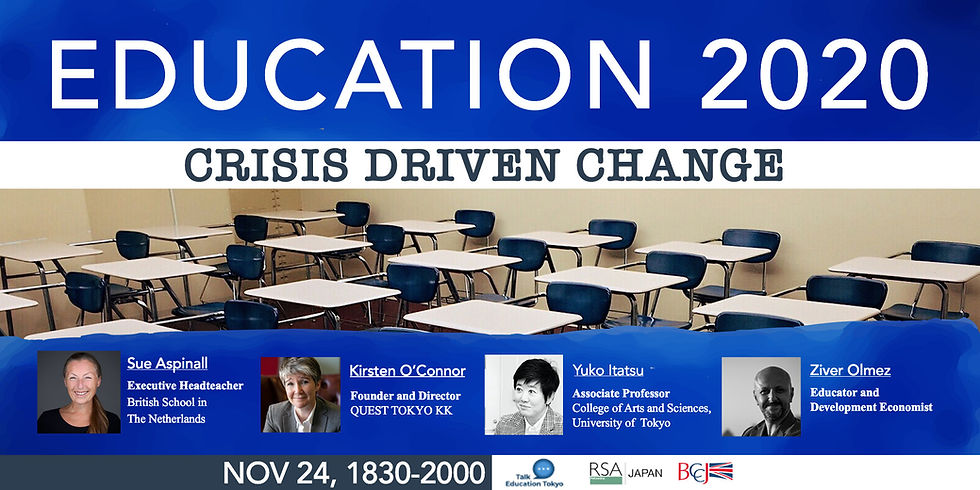RSA JFN Event: Education 2020: Crisis Driven Change
- thersajapan
- 2021年1月2日
- 読了時間: 2分
by Carolina Ceca

Last Tuesday, 24 November, the event entitled “Education 2020: Crisis Driven Change” was held in collaboration with the RSA, BCCJ, and Talk Education Tokyo online in a Webinar format.
The main theme in this panel’s discussion was how the COVID-19 crisis is impacting on education as well as the reactions and new challenges that teachers, parents and students are facing.
Kirsten O’Connor FRSA, Founder and Director of QUEST TOKYO KK, moderated it from Tokyo. Suzanne Aspinall FRSA, Executive Headteacher, British School in The Netherlands, Yuko Itatsu, Ph.D. Associate Professor, College of Arts and Sciences, University of Tokyo, and Ziver Olmez, Educator and Development Economist participated as speakers from The Netherlands, Japan, and Turkey respectively.
Kirsten O’Connor described the moment that we are currently immersed in as a once in a century challenge to improve education, and pointed at how important is to teach students the study skills in order to make them more independent lifelong learners. Conjointly, she elucidated how to prioritize important elements, the use of time, and how to build a network as all of us need the ability to survive.
Suzanne Aspinall expressed that what is now crystallising is important, for example, the aim of children to return to schools along with their necessity of the sense of belonging. During these months, more understanding between family members and educators is taken place, and a real partnership is sprouting. A remarkable challenge is related to how to teach writing with the help of the parents and how to organise them in a safe environment.
Yuko Itatsu depicted the students response to the COVID-19 crisis as outstandingly good. In the case of her university, teachers, until now, have been focusing their attention on research, but recently they have been refocusing and concentrating on improving and adapting education to this new situation. During the first phase of the pandemic, teachers tended to replicate a classroom style lesson via technology. In other words, they were using classical teaching methods to teach online, but they soon found that this methodology didn't work online. Yuko Itatsu considers that nowadays curriculum changes and technology development don’t match, and she explained that developing a sense of community, that includes physical presence and deeper communication are needed. She found that talking about mental health was important for improving education.
Ziver Olmez pointed out how the context that where we are living is crucial, reminding us about growing inequality. Parents are expending more time with children. He pondered that flexibility will make students more productive, and thinks that curriculum, and schools building design must be rethought as they are not as useful as they were.
In my opinion, the speakers introduced many valid points that necessitate more discussion in order to facilitate some of the issues raised in the event. Education probably offers the best path to independent thinking in the present and future.



コメント